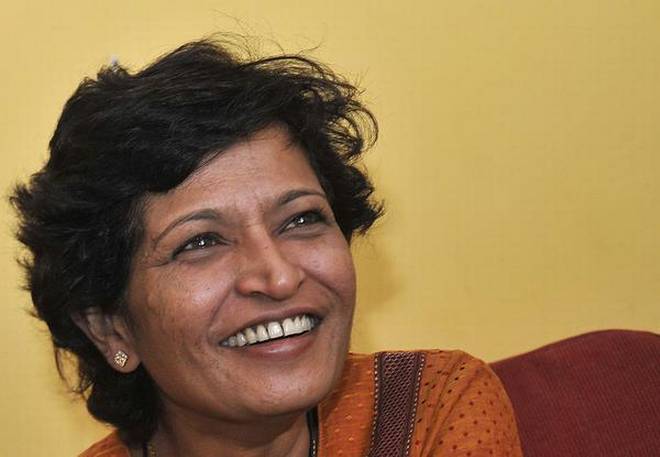
She was such a small diminutive person that a lot of us used to think of her as Gubbachchi, a Kannada word which means “the little sparrow” or “the little one of a sparrow.” The translation does not quite communicate the love, affection and the protective feeling which goes with this word of endearment in Kannada. When she was shot dead and lay crumpled in a pool of blood, she was still a gubbachchi. Beyond all shock and sorrow it also left us wondering as to who could pump bullets into the little body of this gubbachchi. For older people like me who had seen the miracle and metamorphosis of the little sparrow into a feared, hated political being, it was still a surprise that the hyper masculinist nationalist forces were so disturbed by her that they decided to physically eliminate her.
I last met Gauri with K.S Vimala, one of the fiercely committed activists in Bengaluru, when Ganesh Devi, some others and I came out of the Chief Minister’s residence. We had taken a delegation to the CM to request him to expedite the enquiry into the murder of Prof MM Kalaburgi on 30 August 2015 in Dharwad. Gauri and Vimala were to be a part of the delegation. But the confusion between the two offices of the CM (Krishna and Kaveri) had the two of them running to meet us as we were stepping out.
We requested her and Vimala to see the CM again to pursue the matter. When I asked her if anything was being done about the Baba Budangiri controversy she showed her worn out slippers and said “See, I have worn out my footwear pursing it”. We all left the place. Exactly one week later she was shot dead.
I had heard vaguely about her when I come to Shivamogga in 1980. Just a couple of years later her father, the great Kannada writer P. Lankesh launched ‘Lankesh Patrike’, a tabloid which proved to be the most important phenomenon in Karnataka society in the second half of the twentieth century. At the height of its popularity, Lankesh had visited Shivamogga and we, the admiring crowd, took him to a girls’ junior college to talk to the students. Lankesh looked at the students and said, “Oh these little girls, just like our Baby and Gouru.” Baby was Kavitha Lankesh and Gouru was Gauri. After nearly four decades his voice and words tell me how Gauri’s father loved her. Of course, like all children, she took her time not only to acknowledge his legacy but also to carry it forward.
A few years later, some of us who were fighting against the rise of communalism, met again on one late evening, in an ill-lit dingy small room of a college in Shivamogga. In the room which belonged to Prof. Rachappa, a Dalit leader, we founded the Komu Souharda Vedike (Communal Harmony Forum). The Forum went on to lead the struggle to protect the shrine at Baba Budangiri in Chikkamagaluru, which had for several centuries been a sacred place symbolising a syncretic faith. The BJP had decided that they wanted another Gujarat and another Babri Masjid demolition. None of us thought that this small meeting would lead to a powerful movement against communalism wherein the people of Karnataka rose up to protect their plural tradition.
Gauri who had not yet fully come out of her ‘English’ Journalist phase attended some of our preparatory meetings. I was still sceptical about her. But by the third annual meeting at Chikkamagalur, she had not only joined the movement but had the audacity to invite me to “our” meeting! We loved her for this dedication and total immersion. From then onwards she made it her mission and became the most strident voice against the Hindutva forces. Gauri Lankesh Patrike became a powerful platform for communal harmony.
But by then her transformation was amazing. Though she spoke like an adamant ideologue, she became ‘akka’ (sister) to practically all who were unprivileged. Harassed by a hundred legal cases, trolled by the right-wing 24X7, little money to support her tabloid, Gauri was always the ebullient perky little packet of energy.
Many of us had not realised how Gauri had become an integral part of the Kannada imagination. She had became a symbol of empathy, succour and support for thousands. When we saw the ocean of young faces all declaring “I am Gauri” at the protests against her killing, we understood the Gubbachchi had metamorphosed into a tidal force of democracy and dissent. We old men are such tardy learners.




